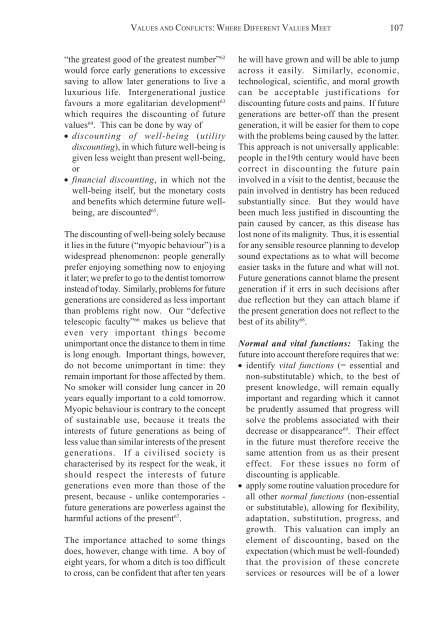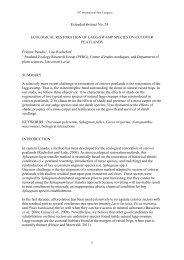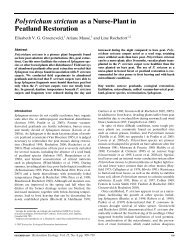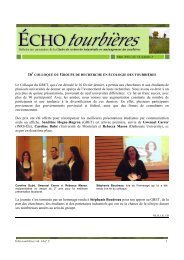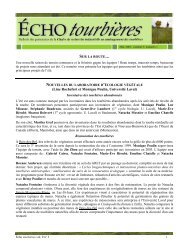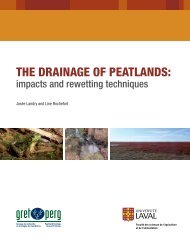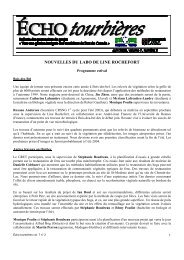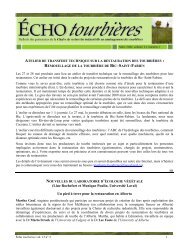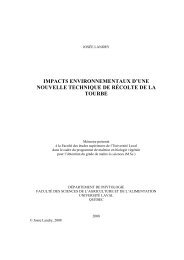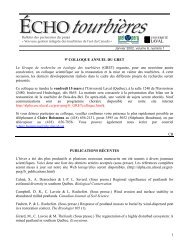wise use of mires and peatlands - Peatland Ecology Research Group
wise use of mires and peatlands - Peatland Ecology Research Group
wise use of mires and peatlands - Peatland Ecology Research Group
Create successful ePaper yourself
Turn your PDF publications into a flip-book with our unique Google optimized e-Paper software.
VALUES AND CONFLICTS: WHERE DIFFERENT VALUES MEET107“the greatest good <strong>of</strong> the greatest number” 62would force early generations to excessivesaving to allow later generations to live aluxurious life. Intergenerational justicefavours a more egalitarian development 63which requires the discounting <strong>of</strong> futurevalues 64 . This can be done by way <strong>of</strong>● discounting <strong>of</strong> well-being (utilitydiscounting), in which future well-being isgiven less weight than present well-being,or● financial discounting, in which not thewell-being itself, but the monetary costs<strong>and</strong> benefits which determine future wellbeing,are discounted 65 .The discounting <strong>of</strong> well-being solely beca<strong>use</strong>it lies in the future (“myopic behaviour”) is awidespread phenomenon: people generallyprefer enjoying something now to enjoyingit later; we prefer to go to the dentist tomorrowinstead <strong>of</strong> today. Similarly, problems for futuregenerations are considered as less importantthan problems right now. Our “defectivetelescopic faculty” 66 makes us believe thateven very important things becomeunimportant once the distance to them in timeis long enough. Important things, however,do not become unimportant in time: theyremain important for those affected by them.No smoker will consider lung cancer in 20years equally important to a cold tomorrow.Myopic behaviour is contrary to the concept<strong>of</strong> sustainable <strong>use</strong>, beca<strong>use</strong> it treats theinterests <strong>of</strong> future generations as being <strong>of</strong>less value than similar interests <strong>of</strong> the presentgenerations. If a civilised society ischaracterised by its respect for the weak, itshould respect the interests <strong>of</strong> futuregenerations even more than those <strong>of</strong> thepresent, beca<strong>use</strong> - unlike contemporaries -future generations are powerless against theharmful actions <strong>of</strong> the present 67 .The importance attached to some thingsdoes, however, change with time. A boy <strong>of</strong>eight years, for whom a ditch is too difficultto cross, can be confident that after ten yearshe will have grown <strong>and</strong> will be able to jumpacross it easily. Similarly, economic,technological, scientific, <strong>and</strong> moral growthcan be acceptable justifications fordiscounting future costs <strong>and</strong> pains. If futuregenerations are better-<strong>of</strong>f than the presentgeneration, it will be easier for them to copewith the problems being ca<strong>use</strong>d by the latter.This approach is not universally applicable:people in the19th century would have beencorrect in discounting the future paininvolved in a visit to the dentist, beca<strong>use</strong> thepain involved in dentistry has been reducedsubstantially since. But they would havebeen much less justified in discounting thepain ca<strong>use</strong>d by cancer, as this disease haslost none <strong>of</strong> its malignity. Thus, it is essentialfor any sensible resource planning to developsound expectations as to what will becomeeasier tasks in the future <strong>and</strong> what will not.Future generations cannot blame the presentgeneration if it errs in such decisions afterdue reflection but they can attach blame ifthe present generation does not reflect to thebest <strong>of</strong> its ability 68 .Normal <strong>and</strong> vital functions: Taking thefuture into account therefore requires that we:● identify vital functions (= essential <strong>and</strong>non-substitutable) which, to the best <strong>of</strong>present knowledge, will remain equallyimportant <strong>and</strong> regarding which it cannotbe prudently assumed that progress willsolve the problems associated with theirdecrease or disappearance 69 . Their effectin the future must therefore receive thesame attention from us as their presenteffect. For these issues no form <strong>of</strong>discounting is applicable.● apply some routine valuation procedure forall other normal functions (non-essentialor substitutable), allowing for flexibility,adaptation, substitution, progress, <strong>and</strong>growth. This valuation can imply anelement <strong>of</strong> discounting, based on theexpectation (which must be well-founded)that the provision <strong>of</strong> these concreteservices or resources will be <strong>of</strong> a lower


